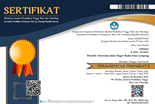Opportunities And Challenges Of Majelis Zikir Dan Selawat On Becoming Indigenous Spiritual-Based Psychotherapy
Abstract
Keywords
Full Text:
PDFReferences
Alford, B. A., & Beck, A. T. (1997). The Integrative Power of Cognitive Therapy. New York, USA: Guilford Press.
Anggraieni, W. N., & Subandi. (2014). Pengaruh Terapi Relaksasi Zikir Untuk Menurunkan Stres Pada Penderita Hipertensi Esensial. In Jurnal Intervensi Psikologi (Vol. 6). https://doi.org/10.20885/intervensipsikologi.vol6.iss1.art6
Aryani, S. A. (2017). Healthy-minded religious phenomenon in shalawatan: A study on the three majelis shalawat in Java. Indonesian Journal of Islam and Muslim Societies, 7(1), 1–30. https://doi.org/10.18326/ijims.v7i1.1-30
Badan Pengembangan & Pembinaan Bahasa Kemendikbud. (2017). Kamus Besar Bahasa Indonesia Online. Jakarta: Badan Pengembangan & Pembinaan Bahasa Kemendikbud.
Bakri, S., & Saifuddin, A. (2019). Sufi Healing: Integrasi Tasawuf dan Psikologi Dalam Penyembuhan Psikis dan Fisik. Depok: Rajagrafindo Persada.
Beck, A. T., & Weishaar, M. E. (2005). Cognitive Therapy. In R. J. Corsini & D. Wedding (Eds.), Current Psychotherapies (7th Ed, pp. 238–268). Belmont: Thomson Brooks/ Cole.
Chaplin, J. P. (1981). Kamus Lengkap Psikologi (K. Kartono, Ed.). Jakarta: RajaGrafindo Persada.
Chaplin, J. P. (1985). Dictionary of Psychology. New York, USA: Dell Publishing.
Cohen, A. B., & Koenig, H. G. (2004). Religion and Mental Health. In C. Spielberger (Ed.), Encyclopedia of Applied Psychology (pp. 255–258). Cambridge, Massachusetts, United States: Academic Press.
Corey, G. (2017). Theory and Practice of Counseling and Psychotherapy (10th Ed). Boston: Cengange Learning.
Creswell, J. W. (2014). Research Design: Qualitative, Quantitative and Mixed Methods Approaches (4th Ed). Thousand Oaks, California, United States: SAGE Publications, Inc.
Cully, J., & Teten, A. L. (2008). A Therapist’s Guide to Brief Cognitif Behavioral Therapy. Houston: Department of Veterans Affairs South Central MIRECC.
Cunningham, C., & Stanley, F. (2003). Indigenous by definition, experience, or world view. BMJ, 327(7412), 403–404. https://doi.org/10.1136/bmj.327.7412.403
Durrand, V. M., Barlow, D. H., & Hofmann, S. G. (2017). Abnormal Psychology: An Integrated Approach (8th Ed). Boston, Massachusetts, United States: Cengage Learning.
Durrand, V. M., Barlow, D. H., & Hofmann, S. G. (2018). Essentials of Abnormal Psychology (8th Ed). Boston, Massachusetts, United States: Cengage Learning.
Dyson, J., Cobb, M., & Forman, D. (1997). The Meaning of Spirituality: A Literature Review. Journal OfAdvanced Nursing, 26, 1183–1188. https://doi.org/10.1046/j.1365-2648.1997.00446.x
Fananie, Z., & Sabardila, A. (2000). Sumber Konflik Masyarakat Muslim Muhammadiyah-NU: Perspektif Keberterimaan Tahlil. Surakarta: Muhammadiyah University Press.
Feist, J., Feist, G. J., & Roberts, T.-A. (2017). Theories Of Personality (8th Ed). New York, USA: McGraw-Hill Education (Asia).
Fourianalistyawati, E. (2018). Kesejahteraan Spiritual Dan Mindfulness Pada Majelis Sahabat Shalawat. Psikis: Jurnal Psikologi Islami, 3(2), 79–85. https://doi.org/10.19109/psikis.v3i2.1406
Franckh, P. (2009). Law of Resonance: Membangkitkan Getaran Hati Untuk Mereguk Kebahagiaan Sejati (F. Ismeth, Ed.). Jakarta: Ufuk Press.
Freud, S. (1923). A General Introduction to Psychoanalysis. New York: Boni & Liveright, Onc. Retrieved from source: http://www.gutenberg.org/ebooks/38219.txt.utf-8%0ACopyright
Geels, A. (1996). A Note on the Psychology of Dhikr: The Halveti-Jerrahi Order of Dervishes in Istanbul. International Journal for the Psychology of Religion, 6(4), 229–251. https://doi.org/10.1207/s15327582ijpr0604_1
Giorgi, A., & Giorgi, B. (2009). Fenomenologi. In J. A. Smith (Ed.), Psikologi Kualitatif: Panduan Praktis Metode Riset (pp. 52–53). Yogyakarta: Pustaka Pelajar.
Ibrahim, A. (2017). Eksistensi Majelis Zikir dan Pembentukan Akhlak Generasi Muda Kota Banda Aceh. Substantia, 19(2), 119–133.
King, L. A. (2016). The Science of Psychology: An Appreciative View. New York, USA: McGraw-Hill Education (Asia).
Kumala, O. D., Kusprayogi, Y., & Nashori, F. (2017). Efektivitas Pelatihan Dzikir dalam Meningkatkan Ketenangan Jiwa pada Lansia Penderita Hipertensi. Psympathic : Jurnal Ilmiah Psikologi, 4(1), 55–66. https://doi.org/10.15575/psy.v4i1.1260
Kumolohadi, R. (2001). Tingkat Stres Dosen Perempuan UII Ditinjau Dari Dukungan Suami. Psikologika, 12(VI), 33–35.
Kusdiyati, S., Ma’arif, B. S. B., & Rahayu, M. S. R. (2012). Hubungan Antara Intensitas Dzikir Dengan Kecerdasan Emosional. Mimbar, XXVIII(1), 31–38.
Losier, M. J. (2008). Law Of Attraction: Mengungkap Rahasia Kehidupan (A. Subiyanto, Ed.). Jakarta: Ufuk Press.
Mardiyono, & Songwathana, P. (2009). Islamic Relaxation Outcomes: A Literature Review. The Malaysian Journal of Nursing, 1(1), 25–30.
Melati, R., & Raudatussalamah. (2012). Hubungan Dukungan Sosial Suami Dengan Motivasi Dalam Menjaga Kesehatan Selama Kehamilan. Jurnal Psikologi, 8(2), 111–118. https://doi.org/http://dx.doi.org/10.24014/jp.v8i2.194
Mirzaei, T., Nematollahi, M., Sabzevari, S., Dehghan, S., & Soleymanpur, M. J. (2015). Short Term Effects of Islamic Zikr on Anxiety, Stress, and Depression in Mothers of Children with Congenital Heart Disease. British Journal of Medicine & Medical Research, 10(4), 1–6. https://doi.org/10.9734/BJMMR/2015/19526 CITATION
Mok, E., Wong, F., & Wong, D. (2010). The meaning of spirituality and spiritual care among the Hong Kong Chinese terminally ill. Journal of Advanced Nursing, 66(2), 360–370. https://doi.org/10.1111/j.1365-2648.2009.05193.x
Moleong, L. J. (2017). Metodologi Penelitian Kualitatif. Bandung: Remaja Rosdakarya.
Muhadjir, N. (2011). Psikodiagnostik Dan Psikotherapy. Yogyakarta: Rake Sarasin.
Muhtarom, A. (2016). Peningkatan Spiritualitas Melalui Zikir Berjamaah: Studi Terhadap Jamaah Zikir Kanzus Sholawat Kota Pekalongan Jawa Tengah). ’Anil Islam, 9(2), 248–267.
Nelson-Jones, R. (2014). Theory and Practice of Counselling and Psychotherapy (4th Ed). Thousand Oaks, California, United States: SAGE Publications Ltd.
Nevid, J. S., Rathus, S. A., & Greene, B. (2017). Abnormal Psychology in a Changing World (10th Ed). London, UK: Pearson Education, Inc.
Newman, L. L. (2004). Faith, spirituality, and religion: A model for understanding the differences. College Student Affairs Journal, 23(2), 102–110.
Papadopoulos, K., Papakonstantinou, D., Koutsoklenis, A., Koustriava, E., & Kouderi, V. (2015). Social Support, Social Networks, and Happiness of Individuals With Visual Impairments. Rehabilitation Counseling Bulletin, 58(4), 240–249. https://doi.org/10.1177/0034355214535471
Rahman, F. N. (2014). Spiritual Healing and Sufi Practices. Nova Journal of Sufism and Spirituality, 2(1), 1–9.
Safara, M., & Bhatia, M. S. (2010). Spiritual Psychotherapy as a Method of Treatment. Delhi Psychiatry Journal, 13(1), 32–35.
Sarwari, A. Q., & Wahab, M. N. A. (2014). The Relationship Between Zikr (Remembrance of Allah), Heart Coherence and Intrapersonal Communication Among Muslim Postgraduate Students From Different Countries. Journal of Language and Communication, 1(2), 137–154.
Sentanu, E. (2013). Quantum Ikhlas® : Teknologi Aktivasi Kekuatan Hati. Jakarta: Elex Media Komputindo.
Sholiha, T. M., Narulita, S., & Mardhiah, I. (2014). (2014). Peran Majelis Dzikir Dalam Pembinaan Akhlak Remaja Putri (Majelis Dzikir Al-Masruriyyah, Cipinang Selatan, Jakarta Timur). Jurnal Studi Al-Qur’an, 10 (2), 2014, 145-159. Jurnal Studi Al-Qur’an, 10(2), 145–159.
Soliman, H., & Mohamed, S. (2013). Effects of Zikr Meditation and Jaw Relaxation on Postoperative Pain, Anxiety and Physiologic Response of Patients Undergoing Abdominal Surgery. Journal of Biology, Agriculture and Healthcare, 3(2), 22–38.
Stewart, G. (2018). What does ‘indigenous’ mean, for me? Educational Philosophy and Theory, 50(8), 740–743. https://doi.org/10.1080/00131857.2017.1302050
Sundberg, N. D., Winebarger, A. A., & Taplin, J. R. (2001). Clinical Psychology: Evolving Theory, Practice, and Research (4th Ed). London, UK: Pearson Education, Inc.
Syafrudin. (2017). Pendidikan Karakter Melalui Aktivitas Zikir. Faktor: Jurnal Ilmiah Kependidikan, 4(3), 291–300. https://doi.org/10.30998/sap.v2i2.2090
Syahid, A. (2016). Being More Psychologically Healthy: The Concept of Mental Health According to Zakiah Daradjat and its Application in Islamic Educational Institutions. Ta’dib: Journal of Islamic Education, 21(1), 13–30.
Walen, H. R., & Lachman, M. E. (2000). Social support and strain from partner, family, and friends: Costs and benefits for men and women in adulthood. Journal of Social and Personal Relationships, 17(1), 5–30. https://doi.org/10.1177/0265407500171001
Wulandari, I., & Huriyati, A. (2015). Anxiety’s Level of Bantenes Patient’s: The Effect of Dhikr Therapy Before Surgical Procedure. International Journal of Research in Medical Sciences, 3(1), 36–40. https://doi.org/10.18203/2320-6012.ijrms20151518
Yusuf, M. A. (2014). Pengaruh Majelis Dzikir Terhadap Keharmonisan Keluarga: Studi Kasus Majelis Dzikir Al-Khidmah Di Pondok Pesantren Hidayatul Falah Bantul Yogyakarta). Skripsi Fakultas Syariah Dan Hukum UIN Sunan Kalijaga (Tidak Diterbitkan).
DOI: http://dx.doi.org/10.24042/ajp.v5i2.13168
Refbacks
- There are currently no refbacks.
Copyright (c) 2022 ANFUSINA: Journal of Psychology











